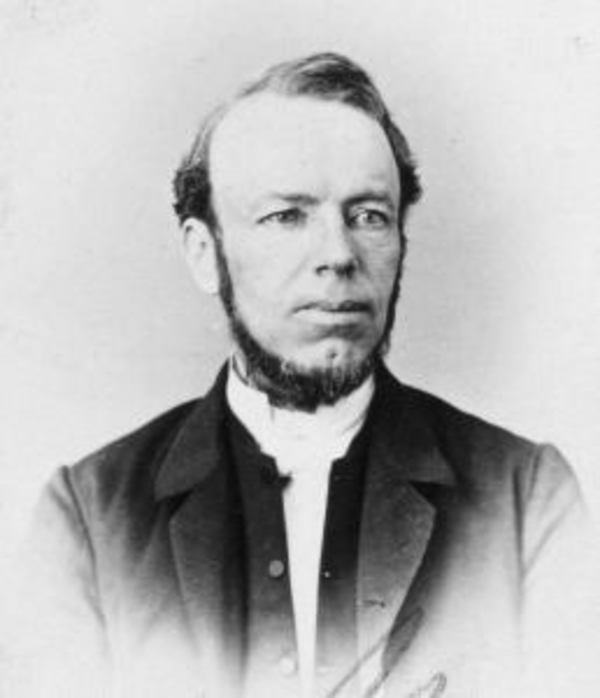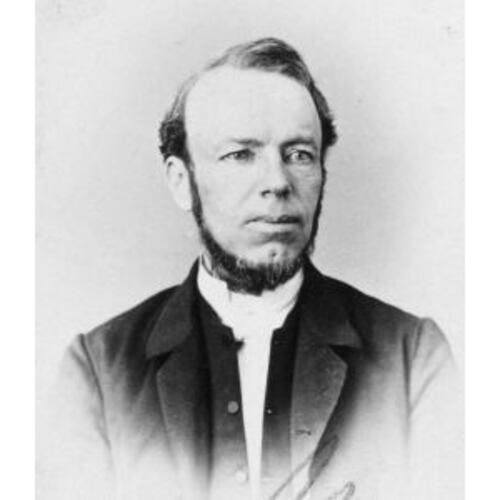
Source: Link
BLAND, HENRY FLESHER, Methodist minister; b. 23 Aug. 1818 in Addingham, England, son of Anthony Bland and Martha Flesher; m. 1846 Emma Levell in Addingham, and they had five sons, of whom Salem Goldworth* and Charles Edward became Methodist ministers; d. 29 Dec. 1898 in Smiths Falls, Ont.
Henry Flesher Bland was “a Methodist of the third generation on both sides,” and his earliest memories centred around his conversion to Methodism at the age of 13 during a revival in his home town. Although his boyhood ambition was to become a missionary, he remained a lay preacher during his time in England. He was also a shopowner, an occupation that did not hinder him from preaching extensively or from taking charge of two important class meetings in Addingham. Bland was active in organizations of political, moral, and social reform, delivering addresses favouring the repeal of the Corn Laws and playing a leading part in popular education by setting up a local mechanics’ institute.
This period of political radicalism and social tension in Britain impressed itself upon the young preacher and confirmed his belief in the power of evangelical Christianity to transform society. His later statement that “Christianity is the true Communism” indicated a forceful conviction that the doctrines of Wesleyan Methodism, with its emphasis on the personal sense of sin, the transforming experience of the soul’s encounter with a personal Christ, Christian perfection, and holy living, offered a powerful alternative to the radical and revolutionary ideologies in Britain during the 1840s. From these central beliefs Bland never deviated.
Bland and his family emigrated to Montreal in June 1858. A lack of funds in the Lower Canada district of the Wesleyan Methodist conference induced church authorities to look askance at the employment of married men with families. By a stroke of luck, however, Bland was appointed to the mission of Lachute. After serving as a circuit preacher and probationer, he preached a trial sermon and was ordained in June 1862.
Despite his initial difficulties, Bland rapidly became a respected member of the Montreal conference. Between 1863 and 1880 he ministered to several large urban congregations in Quebec and eastern Ontario, most notably in Montreal, Quebec, Kingston, and Belleville. He was esteemed by his colleagues as a vigorous preacher and as the successful leader of the church extension movement in Montreal during the 1860s, which, thanks to his energetic campaigning, secured the funds for the building of four new churches. This success was recognized by his election as president of the Montreal conference in 1874, 1876, and 1880, and as president of the General Conference in 1881.
Bland’s arrival in Canada had coincided with the encounter between evangelical religion and Darwinian science and historical criticism of the Bible. As a member of the Wesleyan Literary Association of Kingston in the 1870s, he was well placed to read widely in the popular evolutionary literature of the time. Over the years his journal records an extensive reading list, which included Max Müller’s work on comparative religion, the histories of James Anthony Froude, Thomas Babington Macaulay, and Francis Parkman, and Henry Drummond’s fusion of Spencerian evolution and Christian theology entitled Natural law in the spiritual world. Bland’s response to challenges to his faith was typical of an important section of Canadian Methodism. Although he was by no means unsympathetic to certain aspects of the evolutionary argument, his thought remained anchored in the traditional theology of his early preaching. Indeed, his sermons during the period from 1860 to 1890 continued to be dominated by the ideas of personal sin, repentance, and the infusion of Christ’s presence into the heart of the sinner. His views on the authority and inspiration of the Bible also remained traditional, and showed little evidence of the impact of the “higher criticism.” In his estimation the Bible was nothing less than “The Word of Truth,” a divine revelation incontrovertible as theology, morality, and a history of human society. These views he reinforced by the reading of the great English apologists William Paley and Joseph Butler.
In 1883 Bland was invited to deliver a course of lectures at Victoria College in Cobourg, Ont. Published as Soul-winning, these addresses distilled Bland’s experience as a Methodist preacher. They restated forcefully the traditional insistence on evangelical religion as an individual experience rather than as a system of social ethics. While insisting upon the importance of a liberal education in the training of the clergy, Bland reminded his student audience that their vocation “is not exclusively a human and a prudential one. It bears a higher seal and carries with it a grander authorisation.” He admonished the students against fashionable preaching on social and political questions. A sermon, in his opinion, had to rest upon “Christ and the Bible” as the “legitimate standards” of an authoritative theology.
Bland’s allegiance to the traditions of Wesleyan Methodism was most evident during the movement that resulted in the union of the Methodist churches in 1884. As leader of the anti-unionist forces, he was very concerned that the union of four disparate groups would prove a source of weakness rather than of strength. He also cited the financial strain of dealing with surplus churches and ministers, and he opposed the proposal that would allow equal numbers of lay and ministerial delegates to attend the General Conference as derogatory to the authority of the clergyman.
Bland also took the lead in attempting to persuade the Methodist Church to modify its beliefs about the sinfulness and damnation of young children. His concern stemmed from bitter memories of his conversion experience. He observed that the insistence on an authenticated moment of conversion meant that in practice children who had not achieved such an experience were outside the fellowship of the church. In opposition to other prominent Methodist leaders, Bland argued that Christ had not rejected children as unrepentant sinners and that it was incumbent upon parents and preachers to nurture Christian faith gradually. His position on this subject was a significant indicator of a slow shift in Methodist thinking by which revivalism lost its overwhelming importance. His views implied the development of other “means of grace” such as Sunday schools, “Christian nurture,” and Christian education.
Henry Flesher Bland’s honoured place in the history of Canadian Methodism was a function of the esteem in which he was held as a forceful preacher and effective church builder. Although widely read in the historical and theological literature of his time, he was not an original contributor to current discussions. Indeed, despite the apparent softening of his beliefs about the sinfulness of children, his thought moved entirely within the orbit of the traditional doctrines of Wesleyan Methodism. His career nevertheless illustrates the flexibility and accommodating spirit of the evangelical tradition in adjusting its tenets to an era of intellectual challenge and missionary expansion.
Henry Flesher Bland is the author of Universal childhood drawn to Christ; with an appendix containing remarks on Rev. Dr. Burwash’s “Moral condition of childhood” (Toronto, 1882) and Soul-winning: a course of four lectures delivered under the auspices of the Theological Union of Victoria University . . . (Toronto, 1883).
UCC-C, Biog. files; H. F. Bland papers. Cook, Regenerators. A. B. McKillop, A disciplined intelligence: critical inquiry and Canadian thought in the Victorian era (Montreal, 1979). N. A. E. Semple, “The impact of urbanization on the Methodist Church in central Canada, 1854–84” (phd thesis, Univ. of Toronto, 1979).
Cite This Article
Michael Gauvreau, “BLAND, HENRY FLESHER,” in Dictionary of Canadian Biography, vol. 12, University of Toronto/Université Laval, 2003–, accessed January 20, 2025, https://www.biographi.ca/en/bio/bland_henry_flesher_12E.html.
The citation above shows the format for footnotes and endnotes according to the Chicago manual of style (16th edition). Information to be used in other citation formats:
| Permalink: | https://www.biographi.ca/en/bio/bland_henry_flesher_12E.html |
| Author of Article: | Michael Gauvreau |
| Title of Article: | BLAND, HENRY FLESHER |
| Publication Name: | Dictionary of Canadian Biography, vol. 12 |
| Publisher: | University of Toronto/Université Laval |
| Year of revision: | 1990 |
| Access Date: | January 20, 2025 |



